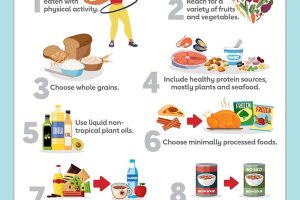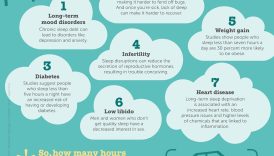10 Simple Steps for a Heart-Healthy You

Importance of Heart Health
Heart health is crucial because it affects overall well-being. A healthy heart ensures that blood circulates efficiently, delivering essential nutrients and oxygen to every corner of the body. When heart health is compromised, it can lead to serious health issues like heart disease, stroke, and even death. Consider this: John, a 50-year-old father of two, found himself short of breath after climbing a flight of stairs. This prompted him to reassess his lifestyle. By prioritizing heart health, he improved his quality of life and increased his energy levels.
- 10 Simple Steps for a Heart-Healthy You
- Importance of Heart Health
- Common Heart Health Risk Factors
- Know Your Numbers
- Blood Pressure
- Cholesterol Levels
- Stay Active
- Benefits of Exercise
- Types of Physical Activities
- Eat a Balanced Diet
- Heart-Healthy Foods
- Limiting Sodium Intake
- Maintain a Healthy Weight
- Body Mass Index (BMI)
- Weight Management Tips
- Manage Stress
- Stress-Reducing Techniques
- Importance of Relaxation
- Get Quality Sleep
- Importance of Sleep for Heart Health
- Tips for Better Sleep
- Quit Smoking
- Effects of Smoking on the Heart
- Smoking Cessation Strategies
- Limit Alcohol Intake
- Impact of Alcohol on Heart Health
- Recommended Alcohol Limits
- Regular Health Check-Ups
- Importance of Check-Ups
- Key Heart Health Screenings
- Practice Heart-Healthy Habits Daily
- Incorporating Small Changes
- Long-Term Heart Health Goals
Common Heart Health Risk Factors
Several risk factors can adversely affect heart health. Understanding these can empower individuals to make beneficial lifestyle choices. Common risk factors include:
- High blood pressure: Often called the silent killer.
- High cholesterol: Contributes to artery-clogging plaque.
- Smoking: Significantly increases the risk of heart disease.
- Diabetes: Affects blood vessels and nerve function.
- Obesity: Unhealthy weight stresses the heart.
By recognizing these factors, individuals like John can take proactive steps towards a healthier heart.
Know Your Numbers
Blood Pressure
Knowing your blood pressure is vital to heart health. It reflects the force of blood against the walls of the arteries, which can indicate how hard your heart is working. For instance, when Sarah, a health-conscious individual, learned that her blood pressure was borderline high, she made instant changes to her diet and exercise routine.
- Normal Blood Pressure: Below 120/80 mmHg
- Prehypertension: 120-139/80-89 mmHg
- Hypertension: 140/90 mmHg and above
By regularly checking blood pressure, individuals can catch potential issues early.
Cholesterol Levels
Cholesterol is another critical number to monitor. There are different types:
- LDL (Bad Cholesterol): Contributes to plaque buildup in arteries.
- HDL (Good Cholesterol): Helps remove LDL from the bloodstream.
Understanding these levels can lead to informed dietary choices. For instance, Mike discovered through regular check-ups that he needed to lower his LDL cholesterol through a heart-healthy diet, leading to improved overall health. Keeping tabs on these numbers is a proactive step towards a healthier heart.
Stay Active
Benefits of Exercise
Staying active is one of the best gifts you can give your heart. Regular exercise strengthens the heart muscle, improves blood circulation, and helps maintain a healthy weight. Emily recently turned her sedentary lifestyle around by incorporating daily walks into her routine, which significantly boosted her energy levels and mood. The benefits of exercise include:
- Lower blood pressure: Helps manage hypertension.
- Improved cholesterol levels: Lowers LDL and raises HDL.
- Enhanced mood: Releases endorphins, leading to feelings of happiness.
- Better sleep: Improves overall sleep quality.
Types of Physical Activities
Incorporating various physical activities can make exercise enjoyable and effective. Some options include:
- Walking or jogging: Simple yet effective aerobic activities.
- Cycling: Great for joint health and cardiovascular fitness.
- Swimming: A low-impact option that works out the entire body.
- Strength training: Builds muscle and supports metabolism.
By choosing activities you enjoy, like Sarah did with dancing, you’re more likely to stay committed and reap the heart health benefits!
Eat a Balanced Diet
Heart-Healthy Foods
Eating a balanced diet is crucial for heart health. Integrating heart-healthy foods into your meals can make a significant difference. For instance, when Alex swapped out processed snacks for fresh fruits and vegetables, he noticed a remarkable boost in his energy levels and overall well-being. Some heart-healthy food choices include:
- Fruits and Vegetables: Packed with vitamins, minerals, and antioxidants.
- Whole Grains: Oats, brown rice, and quinoa help lower cholesterol.
- Lean Proteins: Fish, chicken, and plant-based proteins like beans support muscle health.
- Healthy Fats: Nuts, seeds, and avocados provide essential fatty acids.
Limiting Sodium Intake
While adding healthy foods is important, limiting sodium intake is equally essential for heart health. High sodium can lead to increased blood pressure. Here are some tips to reduce sodium in your diet:
- Read labels: Opt for low-sodium or no-salt-added products.
- Cook at home: Prepping meals from scratch allows better control over ingredients.
- Use herbs and spices: Flavor dishes without adding salt.
By being mindful of food choices, individuals like Alex can pave the way for a healthier heart.
Maintain a Healthy Weight
Body Mass Index (BMI)
Maintaining a healthy weight is critical for heart health, and understanding your Body Mass Index (BMI) is a good first step. BMI is calculated using height and weight to classify individuals into categories: underweight, normal weight, overweight, or obese. For example, when Lisa learned her BMI was in the overweight range, it prompted her to take action and focus on healthier habits.
- BMI Categories:
- Underweight: BMI less than 18.5
- Normal weight: BMI 18.5–24.9
- Overweight: BMI 25–29.9
- Obese: BMI 30 and above
Weight Management Tips
To achieve and maintain a healthy weight, consider these practical tips:
- Set realistic goals: Aim for gradual weight loss instead of drastic changes.
- Portion control: Be mindful of serving sizes to avoid overeating.
- Stay active: Combine exercise with daily activities, like gardening or walking the dog.
By implementing these strategies, Lisa found success in her weight management journey, ultimately improving her heart health and quality of life.
Manage Stress
Stress-Reducing Techniques
Managing stress is essential for heart health, as prolonged stress can contribute to high blood pressure and other cardiovascular problems. Mark, a busy executive, found that incorporating stress-reducing techniques into his daily routine helped him feel calmer and more focused. Some effective techniques include:
- Mindfulness Meditation: Focusing on the present moment helps quiet the mind.
- Deep Breathing Exercises: Inhale deeply for a few seconds, hold, and exhale slowly to reduce tension.
- Progressive Muscle Relaxation: Tensing and relaxing each muscle group to relieve physical stress.
By practicing these techniques regularly, Mark noticed significant improvements in his stress levels and overall health.
Importance of Relaxation
Taking time to relax is equally crucial for heart health. Engaging in activities that bring joy can lower cortisol levels and foster well-being. Whether it’s reading, gardening, or spending time with loved ones, relaxation can recharge both mental and physical health. Prioritizing relaxation helped Mark cultivate a more balanced life, ultimately promoting a healthier heart.
Get Quality Sleep
Importance of Sleep for Heart Health
Quality sleep is often underestimated, yet it plays a vital role in maintaining heart health. Sarah, a mother of three, learned that insufficient sleep could lead to higher blood pressure and increased risk of heart disease. After implementing better sleep habits, she noticed a dramatic improvement in her energy levels and overall health. Poor sleep can contribute to:
- Increased stress levels: Leading to elevated cortisol that impacts heart health.
- Weight gain: Lack of sleep can disrupt hormones that regulate appetite.
- Higher risk of cardiovascular issues: Several studies link sleep deprivation to heart disease.
Tips for Better Sleep
To enhance sleep quality, consider these practical tips:
- Establish a sleep routine: Go to bed and wake up at the same time daily.
- Create a restful environment: Keep your bedroom dark, cool, and quiet.
- Limit screen time: Reduce exposure to screens at least an hour before bedtime.
By adopting these practices, like Sarah did, individuals can enjoy more restorative sleep, benefiting their heart health significantly.
Quit Smoking
Effects of Smoking on the Heart
Quitting smoking is one of the most impactful choices an individual can make for heart health. When Karen, a long-time smoker, decided to quit, she was shocked to learn how smoking affects the heart. Smoking causes damage to blood vessels, increases heart rate, and reduces oxygen levels in the blood, significantly raising the risk of heart disease. Some detrimental effects of smoking include:
- Increased blood pressure: Nicotine narrows blood vessels, forcing the heart to work harder.
- Higher cholesterol levels: Smoking contributes to higher LDL (bad cholesterol) and lower HDL (good cholesterol).
- Formation of blood clots: This can lead to heart attacks or strokes.
Smoking Cessation Strategies
For those ready to quit, here are effective strategies to consider:
- Set a quit date: Having a specific date can create a sense of commitment.
- Seek support: Join support groups or talk to friends and family.
- Consider nicotine replacement therapies: Options like patches or gum can ease withdrawal symptoms.
By implementing these strategies, Karen not only improved her heart health but also enhanced her overall quality of life, proving that it’s never too late to quit smoking.
Limit Alcohol Intake
Impact of Alcohol on Heart Health
Limiting alcohol intake is crucial for maintaining a healthy heart. When Jake realized that his nightly glass of wine had turned into several, he sought to understand the impact of alcohol on his health. Excessive alcohol consumption can lead to high blood pressure, cardiomyopathy, and even irregular heartbeats. Key effects of alcohol on heart health include:
- Increased blood pressure: Even moderate drinking can elevate blood pressure over time.
- Increased calorie intake: Alcoholic beverages are often high in calories, contributing to weight gain.
- Risk of heart disease: Heavy drinking can damage the heart muscle, leading to serious complications.
Recommended Alcohol Limits
To promote heart health, consider these recommended alcohol limits:
- Moderate drinking: Up to one drink per day for women, and up to two for men.
- Consider alcohol-free days: Designating certain days without alcohol can help reduce overall intake.
By setting these boundaries, Jake experienced improved clarity and vitality, making it clear that moderation is key to a healthier heart.
Regular Health Check-Ups
Importance of Check-Ups
Regular health check-ups are vital for proactive management of heart health. When Maria turned 40, she realized it was time to prioritize routine check-ups. These appointments help catch potential health issues before they become serious. Regular screenings can lead to early interventions that save lives. The importance of check-ups includes:
- Monitoring risk factors: High blood pressure and cholesterol can be tracked and managed.
- Understanding personal health: Regular visits help individuals understand their unique health patterns.
- Building a relationship with healthcare providers: This fosters open communication about health concerns.
Key Heart Health Screenings
Here are essential heart health screenings everyone should consider:
- Blood pressure measurement: Checks for hypertension.
- Cholesterol test: Determines levels of LDL and HDL.
- Blood sugar test: Screens for diabetes risk, which is linked to heart disease.
By committing to regular health check-ups, Maria empowered herself with knowledge and confidence in her heart health journey.
Practice Heart-Healthy Habits Daily
Incorporating Small Changes
Practicing heart-healthy habits daily can lead to significant improvements in overall health. When Tom decided to take control of his heart health, he started with small, manageable changes. Instead of an all-or-nothing approach, these gradual adjustments made a big difference without feeling overwhelming. Some small changes to consider include:
- Choosing whole grains over refined options for better fiber intake.
- Opting for water instead of sugary drinks throughout the day.
- Taking the stairs instead of the elevator to increase daily activity.
These minor shifts in daily routines can pave the way for healthier habits.
Long-Term Heart Health Goals
Setting long-term heart health goals is equally important. Tom aimed to reduce his cholesterol levels and maintain a healthy weight over the next year. Key goals may include:
- Maintaining regular exercise: Aim for at least 150 minutes per week.
- Eating a balanced diet: Plan meals with plenty of vegetables, fruits, and lean proteins.
- Regular screenings: Schedule check-ups to monitor progress.
By focusing on these goals, Tom could envision a healthier future, demonstrating that consistent, heart-healthy habits yield lasting benefits.





